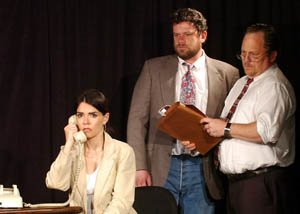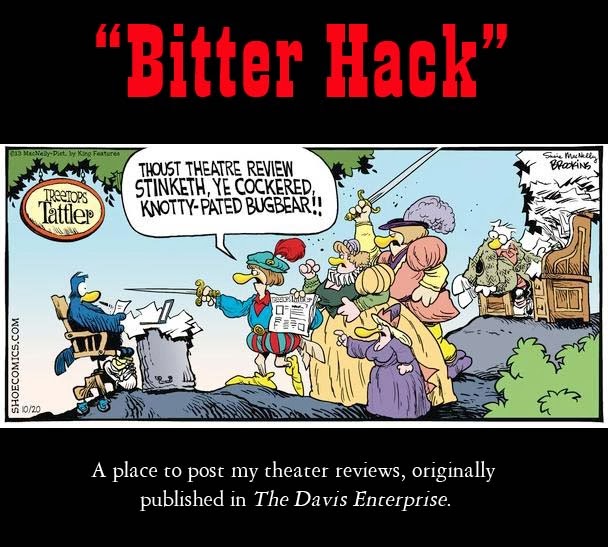“Remember, it’s about sex...and a bit about art,” laughed Jade McCutcheon, directing a scene from the upcoming “Myth, Propaganda and Disaster in Nazi Germany and Contemporary America,” by Stephen Sewell, opening at the Mondavi Center Studio on October 27. The characters are at a reception at the Guggenheim Museum and the air is filled with intrigue and sexual tension.
Billed as a “political thriller from Down Under,” “Myth” presents a compelling and disturbing view of the creeping erosion of democratic rights under the current U.S. administration and draws parallels to Germany as Hitler came to power.
Others have had difficulty with Sewell’s controversial play. Despite a successful run at theatres in Melbourne and Adelaide, no theater in Sydney would touch it. “I am being blocked, have been for some time,” claimed Sewell, “because I don't fit into their agendas, which is to reinforce their audience's beliefs.”
“In Australia, Stephen Sewell is on the political edge,” said McCutcheon. “This play represents only one view – an extreme one perhaps – of the events of 9/11 and subsequent reactions, but it’s important for all of us to step outside our comfort zone sometimes and see how another culture views us.”
This production is only the second in the United States, the first being in Reno in March of this year.
Edward Snyder, playing the central character of Talbot Finch, an Australian expatriate living in the United States, first heard that UC Davis would be presenting the play in March, when he interviewed with McCutcheon for admission as an MFA acting student. He asked her to send him a script. “When I first read this play, I thought it was terrible,” he said. Snyder explained that based on Sewell’s introduction to the play (that it was a response to what he considered the evils of the Bush administration), he expected it to be an indictment of the administration and, by association, the British and Australian governments. “I expected it to tell people ‘this is what you’re supposed to do, to know, to think,’” Snyder said.
He was disappointed when he found the play seemed to do none of those things, but as he worked with McCutcheon he began to understand the play’s power and what Sewell hoped the audience reaction would be.
“Jade re-framed, for me, what the purpose and intention of the play really are. She talked about upholding ambiguities in the play. If we are successful, the audience won’t leave the theater knowing exactly what to think, whom to indict, or how to behave. They will leave asking a lot of questions about what is true and what is real and what their place in reality is in relationship to what is going on with the U.S., British, and Australian governments, what is going on in the world, and in the war on terror.”
To successfully present this play, the cast had a lot of work to do, beyond the memorization of lines. For starters, there was all that history to absorb.
“The joy of directing in a university compared to when I was professionally directing is the permission to educate,” explained McCutcheon. “It becomes a learning tool. The cast had to research information about the Nazi holocaust, and study all the speeches that all the great leaders made, because that’s what Sewell is trying to do in the play, present a comparison of one dictator to another and how madness begins. It’s richer than a history course because the actors are embodying the knowledge. They aren’t just memorizing facts. They have to play a character and be influenced by that information.”
Snyder took immersion in his character very seriously. Professor Talbot is particularly interested in Nazi Germany and contemporary America. Snyder read Noam Chomsky and “The Rise and fall of 3rd Reich.” He studied the 9/11 report and Patriot Act. “Finding out what these things are all about and has been incredibly eye-opening and has transformed me as a person,” he said. “It has allowed me not only to do a better job as an actor, but I now have a better knowledge of what is going on in the world.”
Mary Anderson, playing Talbot’s wife, even did research on the neurobiological effects of torture, so she could understand what might be the effect on a man following a brutal interrogation.
“If Talbot is being tortured, whether it’s real or imagined (because there is that ambiguity in the play), we can actually imagine physically and physiologically what is happening to him.”
Such in-depth analysis of a character is integral to the way McCutcheon approaches the direction of a play.
Jade McCutcheon is perhaps the most interesting person I have ever had the pleasure of interviewing. This Australian-born director has lived a number of lives, with careers which include social worker in the slums of Melbourne (“I was knifed, I was beat up, I was spat upon”), Olympic gymnastic teacher, musician, car mechanic, barmaid, award-winning slalom canoeist, factory worker, and disc jockey. But she found her life’s calling in a pub in Adelaide when she met a group of traveling actors from Holland.
“They looked like they were from another planet, but guess what? My home planet! I had never seen theater in my life. They gave me tickets to Salome and they were brilliant. I nearly fell off my seat.”
By serendipitous coincidence, the group had just lost its stage manager and the actors encouraged McCutcheon to apply for the job. With no theater experience whatsoever, she interviewed with the company manager and within two weeks was packing her bags for what would ultimately be a two-year stint traveling around the world with the International Theater Research Group, an experience she describes as “profound.”
When she left the group after two years, she assumed that was the end of her theater life, so she took up a new career. “I joined a women’s healing center and I got into crystals, aromatherapy, and sound healing.”
She worked at this for a year and a half, but something was still missing, so she enrolled in an arts program at Wollongong University, where she majored in poetry, creative writing and theater. It was there that a play she directed won several awards, toured Australia, and led to her invitation to join N.I.D.A. (The National Institute of Dramatic Arts, which has produced such names as Mel Gibson, Judy Davis, and Cate Blanchett).
She emerged from the program as a freelance director, but after a year and a half found she was still dissatisfied. She had a burning desire to make a difference in the world, and that wasn’t happening.
“I thought-- this is just regurgitating the same old stories...it wasn’t going to help change anything. All this was was climbing up the star ladder, playing games with people.”
Instead she took a year off and, as she describes it, “ went to a rain forest and stared at my navel for a long time. Then I started doing the kind of theater I really wanted to do.”
The theater she really wanted to do included an innovative approach to character development, based on her interest in the traditions of Shamanism. “I focused my doctorate on re-languaging the permission for actors go into those places where no one dares to tread to actually start to build their inner self.”
McCutcheon is, in fact, in the process of writing a book about her work. “I’m using a process which uses body energy centers based on chakras to actually discover the character,” she explained. “I want people to feel a shamanic permission to engage with the earth and its forces. To listen in other ways. To consider we are all part of the one.”
“It’s working with your root, working with your belly, with you solar, chest, mind and crown,”said actress Alice Vasquez, playing the wife of the head of Talbot’s department. “It’s focusing on that part of your body and what it looks like to deliver a line, for example, from your belly, which is something more sensual, than if you’re giving it from your mind which is something that’s very straightforward or from your solar, which is more honest and direct.”
Mary Anderson adds, “we spend at least an hour, sometimes more, warming up every day. In order to kind of maintain a physical connection to each of those body energy center areas it’s really important for me to keep reminding my body what that feels like.”
The attention to body energy explained the electricity I experienced when I attended a rehearsal for “Myth.” Never have I seen a cast so focused, whether they were rehearsing or waiting. Anderson was doing push-ups against a wall, shaking her arms, and touching the parts of her body from which her next lines would come. The actress feels a more emotional connection to her character because of the extra imaginative work.
She explains that the actors take 30-40 minutes a day to lie down in a relaxed state and take a meditative journey to meet their characters in their lives. “We’ll walk around their apartments, they’ll cook us food and so I feel that we have a more textured relationship with our characters.”
This approach to character development and the collaborative work that McCutcheon and her cast are doing allows each character to react to each situation from a real place of familiarity, rather than from a strict set of staging guidelines, but Synder is careful to add that this freedom to make choices is set up under a set of very specific tools for the actors to work with. “As the process goes further along, Jade lays in more and more structure within which all of that play and freedom can occur.”
“Jade really loves to see the organic part of the process,” explains Vasquez. “Instead of setting specific actions for specific lines, she likes to see how things can change from time to time. She gives us options, and from there we’re able to analyze and realize the different dimensions of the specific line.”
“I’m allowed a lot of freedom and a lot of fun,” Snyder says “It blasts wide open possibilities that I can have within a role but it’s also an incredible challenge because I’m responsible for holding all of those possibilities, not just choosing a very narrow set of physical and vocal and intentional choices, but really upholding the full complexity and full range of each of those choices.”
Based on my discussions with McCutcheon and attendance at rehearsals, I feel the audience is in for an extraordinary night of theater, one which will challenge some beliefs, which may be slightly offensive (“The language may be seen as offensive to some. It’s really for mature audiences. There’s no graphic sex but there is violence and language,” warns McCutcheon), but which should definitely accomplish the director’s goal of “feeding the audience a great meal” and leaving them with a lot of questions, the answers to which will undoubtedly differ from person to person.




